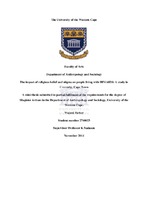| dc.contributor.advisor | Nadasen, Krishnavelli | |
| dc.contributor.author | Parker, Wajeed | |
| dc.date.accessioned | 2015-07-28T14:15:41Z | |
| dc.date.available | 2015-07-28T14:15:41Z | |
| dc.date.issued | 2014 | |
| dc.identifier.uri | http://hdl.handle.net/11394/4332 | |
| dc.description | Magister Artium - MA | en_US |
| dc.description.abstract | This study is a descriptive study and describes the effects of religious beliefs and stigma toward people living with HIV/AIDS. The religions looked at were Islam, Christianity and Hinduism and it was conducted in the community of Cravenby, situated in Cape Town. Its objectives were to investigate; how religion affected people’s attitudes to HIV/AIDS within Cravenby; to investigate how religious beliefs may lead to stigma; does religion allow an individual to disclose his or her HIV status if they are HIV positive; how religion may affect one’s sexual behaviour and how much is known about HIV by people living in Cravenby. The study employed qualitative research methods and the method of data collection was implemented through the use of in depth interviews with community residents. Content analysis was used to analyse the data, with findings showing that those living with HIV/AIDS deserved to be treated with respect and empathy. Respondent's knowledge and awareness of HIV/AIDS was very good and showed that few people have not heard about HIV/AIDS. Stigma is defined as an attribute that is significantly discrediting and is used to set an affected person or group apart from a normalized social order and the use of such separation implies devaluation. Religiously based stigma towards those living with HIV/AIDS arose from people’s personal beliefs and justification because they did not adhere to religious teachings and injunctions. Respondents saw religion as serving to promote cleanliness, marital harmony and respecting one's self and towards others. Biographical disruption implies that a person’s stock of knowledge of their selves and social world are disrupted by the experience of illness and suggests that explanatory frameworks normally used to understand daily life are disrupted. The study recommends having a joint forum which is attended by Muslims, Christians and Hindus discussing HIV/AIDS would help to address incorrect and or incomplete knowledge and beliefs around HIV/AIDS in the community. | en_US |
| dc.language.iso | en | en_US |
| dc.publisher | University of the Western Cape | en_US |
| dc.subject | Stigma | en_US |
| dc.subject | HIV/AIDS | en_US |
| dc.subject | Islam | en_US |
| dc.subject | Christianity | en_US |
| dc.title | The impact of religious belief and stigma on people living with HIV/AIDS : a study in Cravenby, Cape Town | en_US |
| dc.rights.holder | University of the Western Cape | en_US |

